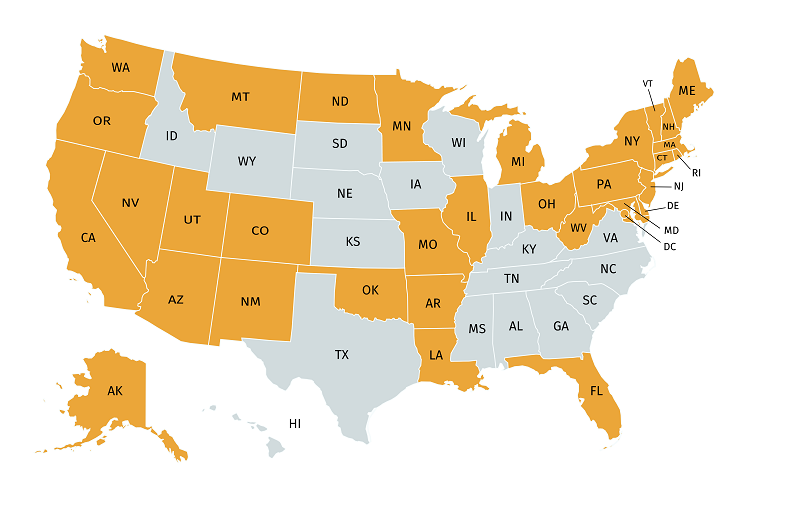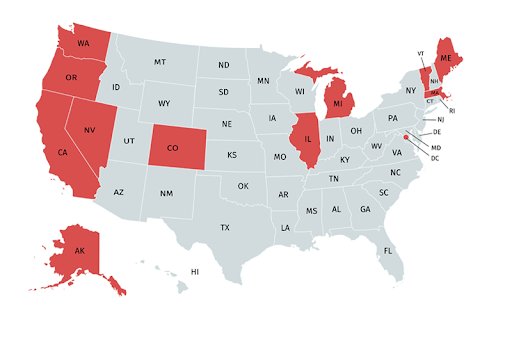Like the United States, Canada has evolved on cannabis legalization for some time. Recently, in 2018, Canada officially legalized cannabis. While cannabis has been legalized for recreational use in several states in the US, there are stark differences in how these legal markets are implemented and regulated. Surprisingly, only 16% of Canadians consume cannabis compared to 22% of Americans, despite the fact that cannabis is legal nationwide in Canada but only in some states in the U.S.
This article will explain the differences between the two nations’ laws to keep cannabis enthusiasts in the know throughout North America.
Canadian Cannabis Laws
Canada’s cannabis history dates all the way back to the early 1800s when the government distributed hemp seeds to farmers to stimulate the economy. In 1923, cannabis was criminalized as a result of the Narcotics Drug Act Amendment Bill. This law didn’t gain popularity until the 1960s and 70s as a result of an uptick in convictions and smoke-in protests.
While decriminalization was proposed in 1972, medical cannabis wasn’t legalized until 2001, with the enactment of the Marihuana for Medical Access Regulations (MMAR). Two years later, Canada decriminalized cannabis and implemented an improved version of the medical cannabis framework, known as Marihuana for Medical Purposes (MMPR).
In 2017, the Canadian government proposed full legalization. Delivering on campaign promises legalize cannabis if elected, Prime Minister Justin Trudeau’s Cannabis Act went into effect in June 2018.
Currently, cannabis is fully legal for adults subject to provincial oversight.
Canada took a bold and effective approach to legalizing cannabis by enacting cannabis laws on a national level. While each province is charged with the implementation of these new laws, national legalization offers multiple benefits to businesses and consumers alike:
- Consumers don’t need to worry about traveling between provinces with cannabis in the same way citizens of the U.S. have to worry about traveling across state lines. All of Canada legally allows adults to possess, procure, and consume cannabis.
- Canada legalized public consumption on a national level, establishing standardized regulations that allow cannabis to be consumed wherever tobacco products are allowed. This gives residents and visitors a legal way to consume the newly-legal products that they have just purchased.
- Canadians may grow cannabis for personal use, with federal legislation allowing the cultivation of up to four plants per home.
- National legalization allows for the use of traditional financial institutions that are federally insured, such as banks, as well as the ability to participate in the country’s stock market.
American Cannabis Laws
Similarly to Canada, the history of cannabis in the U.S. begins centuries ago with hemp farming. As immigrants migrated to the states, a prejudicial association with cannabis and Mexico led to widespread anxiety about the plant and its 1937. The Marihuana Tax Act prohibited the sale of cannabis throughout the United States.
In the 1950s and 60s, cannabis gained popularity, and in 1970, the National Organization for the Reform of Marijuana Laws (NORML) was founded. High Times, one of the nation’s longest-running cannabis publications, would publish its first issue in 1974.
In 1971, Richard Nixon declared a war on drugs. This led to the establishment of the Drug Enforcement Administration, which is still in operation today.
Six years later during the Carter presidency, Jimmy Carter proposed decriminalizing cannabis to congress, but he received strong opposition.
In the 1980s, Ronald Regan vowed to reprioritize the war on drugs, with Nancy Regan launching the Just Say No campaign during that time.
California would be the first to change course from this effort by legalizing medicinal cannabis in 1996. This trend would continue until 2013 when four states legalized adult use cannabis for the first time.
Since then, more than 33 states have some form of cannabis legislation on the books, and 10 states have legalized cannabis for adult recreational use.
Adult Use (Recreational Cannabis) in Massachusetts
America’s patchwork system of cannabis oversight is restricted to individual state markets, which has created a variety of problems for both businesses and consumers. Technically, cannabis is still federally illegal, and transportation between states is prohibited. This creates a large barrier to entry for companies that wish to expand to new markets, as well as confusion among patients and consumers who are traveling between states with legal cannabis but cannot bring cannabis from one state to another.
States Where Medical Cannabis is Legal   Source: Drug Policy Alliance | States Where Recreational Cannabis is Legal   Source: Drug Policy Alliance Source: Drug Policy Alliance |
To add to the confusion, some states have reciprocity agreements that allow patients to possess or even procure cannabis from states other than the one they reside in. At the time of publication, 17 states had a reciprocity agreement in place:
- Alaska
- Arizona
- Arkansas
- California
- Colorado
- Hawaii
- Maine
- Massachusetts
- Michigan
- Nevada
- New Hampshire
- Oklahoma
- Oregon
- Pennsylvania
- Rhode Island
- Washington
- Washington DC
In these states, users are allowed to purchase or possess cannabis, but it is against the law to consume it anywhere but your personal residence or private venues (in accordance with local laws). This prevents consumers from using the products that they legally possess.
Additionally, a lack of national standards for legalization has largely prevented banks and traditional stock exchanges from working with cannabis brands. As a result of 2018’s Farm Bill, credit unions and some markets have become favorable to hemp businesses.
A lack of consistent regulations between states and inadequacy at the federal level has also created an inconsistent market. States have varying quality control when it comes to lab testing to check for pesticides, molds and chemical residues while others can’t keep the products on their shelves. States like Oregon have an oversupply, which has brought down the price per gram to the lowest in the country. While Canada has had its share of national shortages due to an unexpectedly high demand, each of the states with legal cannabis in the U.S. must address this problem on their own, without federal oversight or funding for education.
How Cannabis-Friendly is Your State? The Best and Worst States for Cannabis
3 Actions We Can Take To Effect Change
1. Campaign for legalization on the local level
Voting for pro-cannabis senators and representatives is the best way to bring national change. It also means working with local governments to demonstrate that a legal cannabis market benefits the community at large and can be enjoyed in a responsible manner.
Supporting the efforts of organizations like the National Cannabis Industry Association (NCIA) or Students For Sensible Drug Policy (SSDP) that lobby for change is another way to positively affect legislation.
2. Commit to higher standards
The legal requirements of cannabis quality is the baseline. At Happy Valley, we use best practices and industry standards from long-standing legal industries throughout the world as our model for moving the cannabis industry forward. When it comes to raising the bar on cannabis standards, we choose to lead by example.
3. Absolute transparency in cannabis quality practices
Most states require testing for microbes, pesticides, heavy metals, and harmful chemical residues in cannabis products. All states must have seed-to-sale systems that can track where cannabis comes from and where it’s headed.
Transparency about your products is essential to building trust in the cannabis industry. Transparency gives the industry as a whole cues for integrity in cultivation, production, testing, and consumption, which promotes a safer, more responsible market.
Stay Informed and Up-To-Date
The cannabis laws in the United States are changing rapidly, sometimes on a daily basis. It’s important that consumers and producers stay informed about the laws and pending legislation in the cannabis industry, and any areas they intend to visit. Knowing all of the rules of cannabis possession and consumption no matter where you are will prevent you from encountering any issues while enjoying this unique plant.
To learn more about Massachusetts cannabis laws or to ask any questions you may have, stop by and speak with a Happy Valley Host at one of our cannabis retail locations. Our staff will be able to help you understand current laws about medical use as well as recreational use. To join our mailing list and stay informed, join our mailing list by entering your email below.




